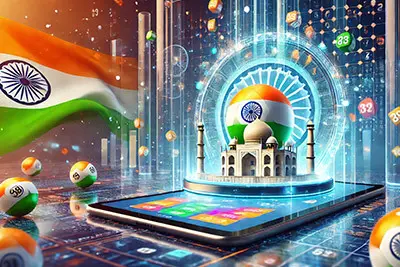
The initiative aims to modernize India’s lottery sector, often criticized for inefficiency and allegations of fraud. Arun Pandey, founder of Rhiti Group, emphasized the platform’s focus on security and convenience. “Our mission,” he said, “is to democratize opportunities through technology.”
The Goa government has assured participants of transparency throughout the lottery process. Narayan Gad, director of Small Savings and Lotteries, described the tech-driven approach as a significant step forward. “The technology-based product will enhance transparency and ensure improved monitoring and regulation of operations,” he stated.
Goa joins 12 other Indian states that permit lotteries, with many others banning them over concerns such as addiction and mismanagement.
Challenges in India’s Lottery Sector
Despite the promise of innovation, India’s lottery industry faces numerous challenges. A 2024 white paper by the Pahle India Foundation (PIF) detailed the inefficiencies of traditional paper-based lotteries. Issues such as counterfeit tickets, loss during transportation, and record-keeping difficulties are common, making the system prone to fraud and corruption.
The paper criticized the industry’s failure to adopt technology despite India’s growing reputation as a tech hub. It stated, “The lottery industry does not adequately leverage the growing access to smartphones and cheap internet.”
Goa’s online platform aims to address these concerns by streamlining the process and reducing reliance on physical tickets. Yet, online systems are not immune to manipulation, as evidenced by past experiences in Kerala and Maharashtra. In Kerala, a poorly managed online lottery led to the state banning all internet-based games. A 2015 Supreme Court ruling upheld this decision, citing risks such as tampered terminals and fake tickets.
Responsible Gaming and Social Impact
Great Goa Games has placed significant emphasis on responsible gaming. The platform includes educational tools to help participants gamble responsibly. Moreover, players will be able to track how lottery revenues are allocated, with funds reportedly earmarked for education, healthcare, and other social programs.
The platform aims to ensure transparency in operations while supporting community welfare initiatives. Goa hopes this approach will set an example for other states in India to follow.
Revenue Potential and Economic Impact
India’s lottery sector generates an estimated $33 billion annually, with potential tax revenues of $12 billion. Goa’s entry into the online lottery space could contribute significantly to this figure. By transitioning to a fully digital platform, Goa aims to attract tech-savvy players while minimizing operational inefficiencies.
Known as the “Las Vegas of India,” Goa has long been a leader in regulated gaming and entertainment. The online lottery is expected to enhance its reputation as a hub for innovation in gaming.
Despite lingering concerns over the risks associated with online platforms, the Goa government is confident that its technology-driven approach will improve the lottery industry’s image and functionality.
The success of the Great Goa Games could pave the way for other Indian states to embrace digital lotteries, aligning with the country’s broader vision of digital transformation.
Source:
“State to launch tech-based lottery, bumper prize to be over ₹50cr” timesofindia.indiatimes.com, 20 de noviembre de 2024.




